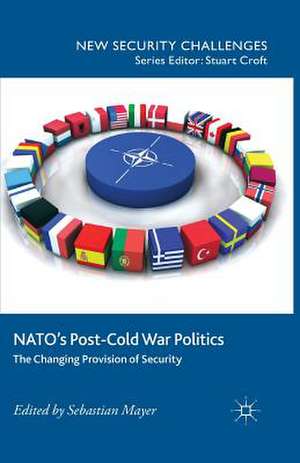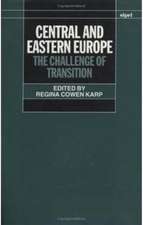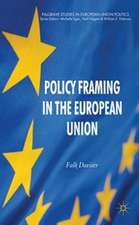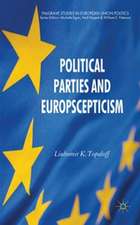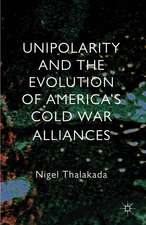NATO’s Post-Cold War Politics: The Changing Provision of Security: New Security Challenges
Editat de S. Mayeren Limba Engleză Paperback – 2014
| Toate formatele și edițiile | Preț | Express |
|---|---|---|
| Paperback (1) | 726.37 lei 6-8 săpt. | |
| Palgrave Macmillan UK – 2014 | 726.37 lei 6-8 săpt. | |
| Hardback (1) | 732.70 lei 6-8 săpt. | |
| Palgrave Macmillan UK – 22 aug 2014 | 732.70 lei 6-8 săpt. |
Din seria New Security Challenges
- 9%
 Preț: 763.33 lei
Preț: 763.33 lei -
 Preț: 390.63 lei
Preț: 390.63 lei - 15%
 Preț: 636.94 lei
Preț: 636.94 lei - 15%
 Preț: 580.68 lei
Preț: 580.68 lei -
 Preț: 381.59 lei
Preț: 381.59 lei - 15%
 Preț: 644.95 lei
Preț: 644.95 lei -
 Preț: 386.61 lei
Preț: 386.61 lei -
 Preț: 391.61 lei
Preț: 391.61 lei -
 Preț: 385.84 lei
Preț: 385.84 lei -
 Preț: 389.88 lei
Preț: 389.88 lei -
 Preț: 428.07 lei
Preț: 428.07 lei - 15%
 Preț: 649.06 lei
Preț: 649.06 lei -
 Preț: 383.93 lei
Preț: 383.93 lei -
 Preț: 390.63 lei
Preț: 390.63 lei -
 Preț: 388.13 lei
Preț: 388.13 lei -
 Preț: 382.18 lei
Preț: 382.18 lei -
 Preț: 392.60 lei
Preț: 392.60 lei -
 Preț: 388.72 lei
Preț: 388.72 lei -
 Preț: 387.38 lei
Preț: 387.38 lei - 15%
 Preț: 695.70 lei
Preț: 695.70 lei - 15%
 Preț: 584.43 lei
Preț: 584.43 lei -
 Preț: 383.93 lei
Preț: 383.93 lei -
 Preț: 384.86 lei
Preț: 384.86 lei -
 Preț: 388.52 lei
Preț: 388.52 lei - 15%
 Preț: 699.77 lei
Preț: 699.77 lei -
 Preț: 384.09 lei
Preț: 384.09 lei -
 Preț: 388.13 lei
Preț: 388.13 lei -
 Preț: 385.47 lei
Preț: 385.47 lei - 15%
 Preț: 640.88 lei
Preț: 640.88 lei -
 Preț: 385.84 lei
Preț: 385.84 lei -
 Preț: 383.93 lei
Preț: 383.93 lei -
 Preț: 382.75 lei
Preț: 382.75 lei -
 Preț: 389.70 lei
Preț: 389.70 lei - 15%
 Preț: 697.97 lei
Preț: 697.97 lei -
 Preț: 382.95 lei
Preț: 382.95 lei -
 Preț: 387.38 lei
Preț: 387.38 lei
Preț: 726.37 lei
Preț vechi: 885.82 lei
-18% Nou
Puncte Express: 1090
Preț estimativ în valută:
139.01€ • 150.94$ • 116.77£
139.01€ • 150.94$ • 116.77£
Carte tipărită la comandă
Livrare economică 22 aprilie-06 mai
Preluare comenzi: 021 569.72.76
Specificații
ISBN-13: 9781349460922
ISBN-10: 1349460923
Pagini: 334
Ilustrații: XIII, 334 p.
Dimensiuni: 140 x 216 x 19 mm
Greutate: 0.41 kg
Ediția:1st ed. 2014
Editura: Palgrave Macmillan UK
Colecția Palgrave Macmillan
Seria New Security Challenges
Locul publicării:London, United Kingdom
ISBN-10: 1349460923
Pagini: 334
Ilustrații: XIII, 334 p.
Dimensiuni: 140 x 216 x 19 mm
Greutate: 0.41 kg
Ediția:1st ed. 2014
Editura: Palgrave Macmillan UK
Colecția Palgrave Macmillan
Seria New Security Challenges
Locul publicării:London, United Kingdom
Cuprins
1. Introduction: NATO as an Organization and Bureaucracy; Sebastian Mayer PART I: THE ORIGINS OF NATO AND ITS BUREAUCRATIC DEVELOPMENT DURING THE COLD WAR 2. From London to Brussels: Emergence and Development of a Politico-Administrative System; Gustav Schmidt 3. Institutionalizing NATO's Military Bureaucracy: The Making of an Integrated Chain of Command; Dieter Krüger PART II: CHANGING SECURITY CHALLENGES AND NATO'S NEW IDENTITY 4. Post-Bipolar Challenges: New Visions and New Activities; Trine Flockhart 5. Self-Presentation and Impression Management: NATO's New Public Diplomacy; Odette Tomescu-Hatto PART III: NATO'S POST-COLD WAR BUREAUCRACY, CONSENSUS-BUILDING, AND DECISION-MAKING 6. NATO Decision-Making: The 'Consensus Rule' Endures Despite Challenges; Leo G. Michel 7. The Changing Role of NATO's Secretary General; Ryan C. Hendrickson 8. Coping with Complexity: Informal Political Forums at NATO's Headquarters; Sebastian Mayer and Olaf Theiler 9. Enduring Rules, Changing Practices: NATO's Post-Cold War Military Committee and International Military Staff; Jo G. Gade and Paal Sigurd Hilde 10. Perfectly Flawed? The Evolution of NATO's Force Generation Process; John R. Deni 11. The Impact of NATO's Defence Planning and Force Generation on Member States; Christian Tuschhoff PART IV. NATO'S RELATIONS WITH THIRD-PARTY ACTORS 12. NATO's Troubled Relations with Partner Organizations. A Resource Dependence Explanation; Rafael Bierman 13. In the Line of Fire: NATO-NGO Relations from Bosnia to Afghanistan; M. J. Williams 14. Partners vs. Members? NATO as an Arena for Coalitions; Janne Haaland Matláry PART V: EXTERNAL POWER STRUCTURES AND GLOBAL SECURITY 15. Informal Cooperation Beyond the Alliance; Mette Eilstrup-Sangiovanni 16. NATO's Transformation and Global Security; Sean Kay and Magnus Petersson 17. Conclusion: NATO's Transformed Provision of Security; Sebastian Mayer
Recenzii
"In this well-crafted volume, Sebastian Mayer has assembled a distinguished group of experts to explore in unprecedented detail how NATO's bureaucracy and decision-making have changed since the cold war and with what implications for transatlantic security."- John S. Duffield, Professor, Georgia State University, USA
"This extraordinary volume brings together many of the top NATO experts from both sides of the Atlantic. It covers the full range of issues, from the history of NATO to its post-Cold War evolution, the role of the Secretary General, relations with NGOs and more. Anyone who wants to understand NATO's transformation must read this book." - James Goldgeier, Professor, American University, USA
"This volume offers an innovative analytical perspective on NATO. Taking the Alliance seriously as a complex institution and administration of security governance, the chapters describe important aspects of NATO's post-Cold War institutional transformation and explore their driving forces and limits of institutional development. Essential reading for anyone interested in understanding how NATO works and in looking beyond the superficial debate on 'NATO's decline'." - Frank Schimmelfennig, Professor, Swiss Federal Institute of Technology, Switzerland
"This excellent book brings together valuable and path-breaking analyses of the neglected topic of decision-making in NATO, including the Alliance's relations with partner nations and organizations."- David Yost, Professor, U.S. Naval Postgraduate School, USA
"This extraordinary volume brings together many of the top NATO experts from both sides of the Atlantic. It covers the full range of issues, from the history of NATO to its post-Cold War evolution, the role of the Secretary General, relations with NGOs and more. Anyone who wants to understand NATO's transformation must read this book." - James Goldgeier, Professor, American University, USA
"This volume offers an innovative analytical perspective on NATO. Taking the Alliance seriously as a complex institution and administration of security governance, the chapters describe important aspects of NATO's post-Cold War institutional transformation and explore their driving forces and limits of institutional development. Essential reading for anyone interested in understanding how NATO works and in looking beyond the superficial debate on 'NATO's decline'." - Frank Schimmelfennig, Professor, Swiss Federal Institute of Technology, Switzerland
"This excellent book brings together valuable and path-breaking analyses of the neglected topic of decision-making in NATO, including the Alliance's relations with partner nations and organizations."- David Yost, Professor, U.S. Naval Postgraduate School, USA
Notă biografică
Rafael Biermann, University of Jena, GermanyJohn R. Deni, Strategic Studies Institute, USAMette Eilstrup-Sangiovanni, University of Cambridge, UKTrine Flockhart, Danish Institute for International Studies, DenmarkJo G. Gade, Norwegian Defence University College, NorwayJanne Haaland Matláry, Norwegian Defence University College, NorwayRyan C. Hendrickson, Eastern Illinois University, USAPaal Sigurd Hilde, Norwegian Defence University College, NorwaySean Kay, Ohio Wesleyan University, USADieter Krüger, University of Potsdam, GermanyLeo G. Michel, National Defense University, USAMagnus Petersson, Norwegian Institute for Defence Studies, NorwayGustav Schmidt, Ruhr-Universität Bochum, GermanyOlaf Theiler, German Ministry of Defence, GermanyOdette Tomescu-Hatto, Institut d'Etudes Politiques de Paris (Sciences Po), FranceChristian Tuschhoff, Free University Berlin, GermanyM. J. Williams, University of London, UK
